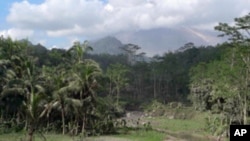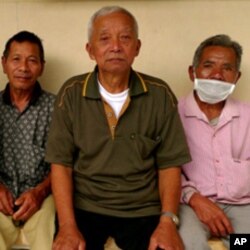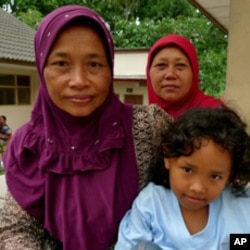The sounds of children playing in emergency shelters at the base of Indonesia's Mount Merapi are a welcome break from the explosions heard hours earlier.
Earlier in the day, panic ensued after a series of eruptions rained ash and debris down on villages as far as six kilometers from the volcano's crater. The clouds of hot gas billowed from Merapi for nearly three hours, stirring fears that the volcano's wrath is far from finished.
One week after the volcano first came to life, more than 38 people have been killed and 70,000 confined to emergency shelters. Morale in the camps is low, and many refugees say they pine for home.
All are aware of the dangers of returning. But many go back to check on their homes and cattle during the day, at times when the volcano is most calm. The head of the mobile brigade near the Umbulharjo evacuation center, Dodik Slamet, is charged with seeing who goes in and out of the evacuation checkpoint. His job is to ensure people are safe, he says, but he also cannot prevent them from protecting their livelihoods.
There are still many cattle there and the cattle are peoples' only treasure, says Dodik Slamet. He cannot prohibit people from returning to their homes, he says, because if they do not go back, the cattle will die.
Trucks and motorbikes with grass strapped to the back are the only vehicles that ply the dust-covered road past Umbulharjo. Refugees there moved to a rescue shelter further down the volcano after an eruption Saturday caused concern that debris might reach the safety zone.
More than 2,000 refugees are staying nearby, at the Kepuharjo evacuation shelter. Rescue workers say supplies are adequate, but they are having trouble with sanitation. Doctors worry about the spread of disease as children get colds and eye infections.
Some of the women and children having been living here for a week. They say they are bored, and have too much time to think about the homes they know have been destroyed.
Fifty-year-old Parmi says she is glad to have her health, but she cannot stop thinking about all that she has lost. Everything at my home is gone, she says. Parmi thanks God she still has her family together, but says she does not know how she can go back. She says she fears returning to a home that is not livable.
The eruptions could continue for weeks, say government volcanologists, since the volcano has not released all the pressure built up beneath a lava dome in its crater. And that fact could strain the government's ability to care for all the refugees, particularly since it must also provide aid to victims of a tsunami that struck off the coast of west Sumatra just one day before Merapi erupted.
The death toll from the tsunami stands at more than 430 dead with another 15,000 homeless. The number missing dropped to less than 100 after many were found alive by search and rescue teams during the weekend.
But rough weather continues to prevent aid from getting to the remote Mentawai Islands, and many in need of immediate medical care cannot be evacuated. Indonesia sits on the Pacific Ring of Fire, an area prone to frequent earthquakes and volcanic activity.
Mount Merapi is one of nearly 200 active volcanoes on this vast island nation. The latest eruption is the volcano's third in two decades, but those who remember the 1994 blast that killed 60 people say this one is worse. With searing gas continuing to speed down the mountain, they say they fear they fear what is to come.






